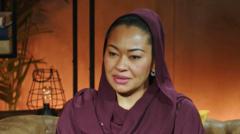The case of Senator Natasha Akpoti-Uduaghan shines a light on the challenges faced by women in Nigerian politics. Accused of sexual harassment by a powerful figure, she claims her subsequent suspension and attempts to unseat her highlight the pervasive sexism and barriers women face in government.
Nigerian Senator Confronts Misuse of Authority Amid Sexual Harassment Allegations

Nigerian Senator Confronts Misuse of Authority Amid Sexual Harassment Allegations
Senator Natasha Akpoti-Uduaghan alleges she faced retaliation for rejecting advances from a high-ranking political figure, sparking a debate on gender inequalities in Nigerian politics.
Senator Natasha Akpoti-Uduaghan's recent experiences have cast a stark light on the gender dynamics within Nigeria's political landscape, revealing troubling patterns of abuse of power. After accusing one of Nigeria's most influential politicians, Godswill Akpabio, of sexual harassment during a national broadcast, Akpoti-Uduaghan faced swift repercussions. Rather than receiving support, she was suspended from the Senate for six months without pay, a move she believes was punitive for rejecting Akpabio's advances.
Currently one of only four women in Nigeria's 109-seat Senate, Akpoti-Uduaghan's ordeal has drawn widespread attention and ignited discussions about the prevalent sexism in the country's political sphere. Amid her suspension, backlash from her constituency emerged, with some voters even rallying to have her ousted—a response that emphasizes the risks faced by women who stand against established male power.
Nigeria's lack of women in political roles is notable; it ranks last in female parliamentary representation in Africa. Disappointingly, the nation is also listed among the bottom five countries globally in terms of women's participation in governance. The Senator's case has been seen by advocates as emblematic of broader systemic issues that discourage women from entering politics or speaking out against abuse.
In response to the allegations, Akpabio, through his legal representation, has denied wrongdoing. Given the gravity of accusations leveled against such a prominent figure, advocates and analysts, including former Nigerian Minister of Education Obiageli Ezekwesili, have underscored the significance of the situation. Ezekwesili remarked that this incident represents a "classic abuse of power" in which women's voices are often marginalized.
As the fallout continues, Akpoti-Uduaghan remains resolute in her fight against the suppression of women's rights in Nigeria, vowing to continue her work despite the personal and professional challenges she faces. Her courage may inspire a continuing dialogue on women's empowerment and the fight for justice within a political framework resistant to change.


















